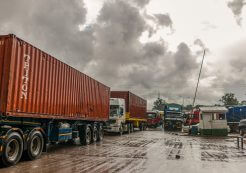The Public-Private Sector Dialogue (PPD) for Trade and Investment Programme mainstreams advocacy throughout TMA’s project clusters, i.e. in transport and logistics, trade facilitation, customs and tax, standards, NTBs and export capability. The programme’s core objective is to enhance private sector organisations’ (PSO) capacity to proactively and positively influence policy reforms, to accelerate dispute resolution and sustain political buy-in to boost trade and investment in the EAC. The Programme contributes to core TMA corporate results outlined below:
- Reduce transport (road, rail, and air) cost and time along transport corridors by 10% and increase efficiency in private sector logistics services provision;
Overview
The Public-Private Sector Dialogue (PPD) for Trade and Investment Programme mainstreams advocacy throughout TMA’s project clusters, i.e. in transport and logistics, trade facilitation, customs and tax, standards, NTBs and export capability. The programme’s core objective is to enhance private sector organisations’ (PSO) capacity to proactively and positively influence policy reforms, to accelerate dispute resolution and sustain political buy-in to boost trade and investment in the EAC. The Programme contributes to core TMA corporate results outlined below:
- Reduce transport (road, rail, and air) cost and time along transport corridors by 10% and increase efficiency in private sector logistics services provision;
- Enhance efficiency of customs and other trade-related agencies (25% reduction in time to process trade documentation) through integrated trade management systems and greater inter-agency collaboration;
- Reduce tariffs, taxes, and levies by 5 to 8% overall (including sub-national), reduce exemption regimes, CET, and increase import/export tax incentives;
- Enhance the efficiency of Bureaux of Standards, reduce related costs and time by 10%, reduce counterfeit and sub-standard goods by 20% through enhanced inter-agency collaboration and improve private sector compliance;
- Resolve 30% of all reported NTBs; and
- Catalyse a 10% increase in exports, jobs and investment.
The programme extends beyond the EAC and incorporates Common Markets for Eastern and Southern Africa (COMESA), Africa Continental Free Trade Area (AfCFTA) and the Economic Partnership Agreement (EPA), as trade flow patterns shift with a focus on inter-regional trade. Given rapid development in the AfCFTA; the programme seeks to support private sector input into current trade negotiations and dispute resolution mechanisms, ensuring that agreements and legal frameworks are shaped to facilitate trade.























